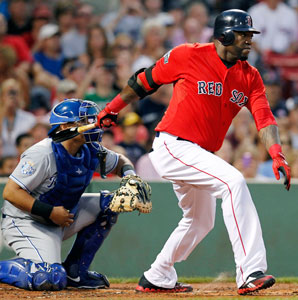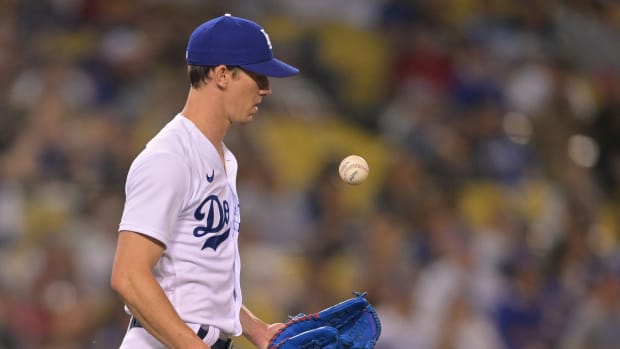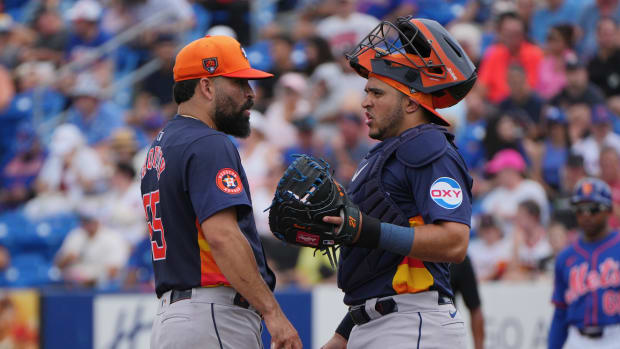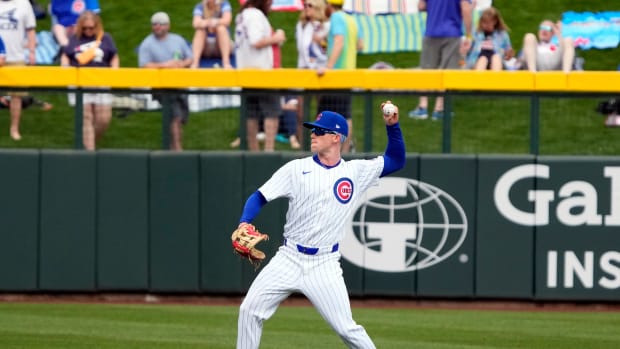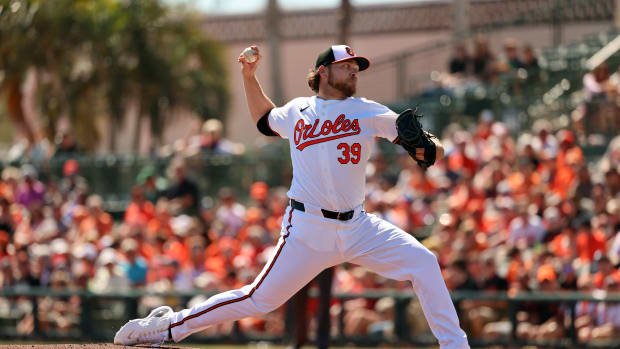Sitdown or no, Ortiz's return to Red Sox makes sense
David Ortiz played just one game for the Red Sox after July 16. (AP)
Rarely is there a dull moment around David Ortiz. The iconic Red Sox slugger is said to be nearing agreement on a two-year deal that will keep him in Boston through his age 38 season, but even so, former manager Bobby Valentine is raining on the impending parade, suggesting that Ortiz quit on the team. On the heels of a disastrous 69-93 season in which the team missed the playoff for the third straight year, Boston's upper management has little choice but to side with the most popular player of their past decade instead of a wildly unpopular ex-skipper who was all but tarred and feathered before being fired. It's a public relations no-brainer.
Ortiz was in the midst of his best season since 2007 when he went on the disabled list on July 17 due to a strained Achilles tendon in his right foot. At the time, the Red Sox were 46-44, tied for third in the AL East at 9 1/2 games back but just one game behind the Tigers for the second wild-card spot, albeit with four other teams within one game as well. Ortiz's injury initially wasn't believed to be severe; describing his departure from the July 16 game, the Boston Globe's Nick Cafardo reported, "The early prognosis is Ortiz will be OK, but he may have to sit out a few days."
Instead, Ortiz was placed on the disabled list, and three weeks later was complaining of pain during his rehab and admitting he didn't want to risk reinjury. He didn't return until Aug. 24, having missed a 35-game stretch over which Boston went 13-22, ending their hopes of contention. Ortiz went 2-for-4 with a double that day, then immediately returned to the DL. He underwent a platelet-rich plasma injection, which he hoped would give him a "60-70 percent chance" to return before the end of the season, but he didn't play another game. He finished the year with a . 318/.415/.611 line — his highest numbers in each category over the past five seasons — and 23 homers in 383 plate appearances. His 90 games were his lowest total since 2001, when he played 89 games for the Twins, but despite the missed time, his 3.0 Wins Above Replacement Player slightly edged the 2.9 WARP he averaged from 2010-2011.
In an interview with Bob Costas for NBC Sports Network that aired on Tuesday night, Valentine alleged that the blockbuster trade with the Dodgers — news of which broke on the night of Aug. 24 — triggered Ortiz's sit-down:
"David Ortiz came back after spending about six weeks on the disabled list and we thought it was only going to be a week. He got two hits the first two times up, drove in a couple runs; we were off to the races. Then he realized that this trade meant that we're not going to run this race and we're not even going to finish the race properly and he decided not to play anymore. I think at that time it was all downhill from there."
Ouch. Given Valentine's reputation for fanning the flames in the media — particularly during his Boston stint — it's difficult to take his comments at face value, as he talked himself into more corners than there exist in Fenway Park's irregularly shaped outfield. Even given reports of friction between the manager and established players such as Josh Beckett, Kevin Youkilis and Dustin Pedroia, Ortiz was publiclysupportive of Valentine, and in late August, the manager sounded as though he was on the same page with the team's medical staff and the player about a possible return.
Which isn't to say Ortiz is innocent. Since "settling" for a one-year, $14.575 million deal last winter — a 17 percent raise over his 2011 salary — he publicly bemoaned his contract status several times, claiming that Boston's offer of arbitration was "humiliating" and "embarrassing." Such complaints have become an annual tradition, as one local radio station put it, "like the leaves falling." In late September, Ortiz said he sought respect in his next deal, not money.
Though he had to know he would get both from Boston based upon his strong 2012 numbers, Ortiz's lack of job security and the team's noncontender status gave him an easy, team-sanctioned reason to avoid risking reinjury, and he took it. If general manager Ben Cherington and the team's upper management — all of whom know more about Ortiz's medical status than the rest of the industry, obviously — thought he was malingering, they almost certainly would be cutting ties with the slugger. Instead, they're said to be nearing a two-year deal in the neighborhood of $25 million, which would equal the annual value of his 2011 salary. To be worth that, Ortiz only has to average about 2.0 WARP a year; he has averaged 2.3 per year since 2008, a span that included a two-year downturn (2008-2009) that looked as though it might be the beginning of the end. Since that time, he has evolved as a hitter, using the whole field more often and cutting down his strikeout rate considerably; his 13.3 percent K rate in 2012 was a career low, five percentage points below his 1997-2011 rate.






























